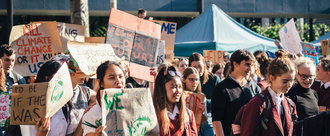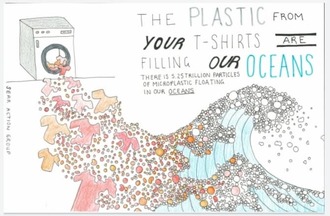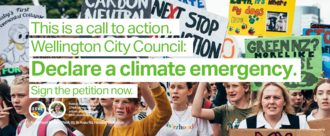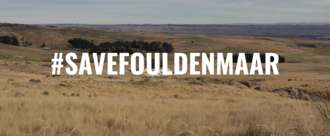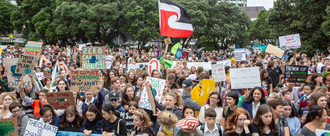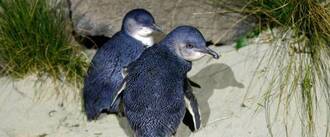-
GDC - Declare a Climate EmergencyThis is a call to action for our representatives to declare a climate emergency for Gisborne and to take decisive action. Climate breakdown is a challenge for all humanity, but it is also our biggest opportunity. By declaring a climate emergency we can ensure our representatives make the necessary decisions in time to save our local ecosystems and our planet. The effects of climate change strike to the heart of our communities and will have a major impact on local schools, residents, and businesses. We need urgent and strategic from our local council representatives to address the challenge seriously. We have the means and access to resources to transition, and we also have an obligation to countries worst affected by climate change. Climate breakdown is challenging, but by decarbonising our economy, we will create more time for doing the things we love, with the people we love, in the nature we love. It will mean working less and sharing more. Driving less and cycling more. Polluting less and planting more. A shift away from our consumer culture to re-invigorating community will mean we get to spend more time gardening, cooking, learning, reading, sharing, laughing, dancing, and singing together instead of spending hours on social media, or money on things we don’t need, for connection and validation. It will mean paying the people who work in low-carbon jobs such as caregiving, teaching, nursing, healing, and restoration generously instead of bankers, polluters and corporate billionaires extracting all the wealth from the rest of us and our Earth. In taking decisions we urge council members to consult with local Iwi within Ngati Porou and Turanga-Nui-A-Kiwa rohe at all times. We support the call of the National Māori Climate Network for urgent action. We can create a green and beautiful future, we just need to have the courage to take action, and we ask our representatives to show us the way. We can be leaders in the climate action space and set an example for other councils, and the country, to follow. Read and sign 'An Open Letter from the Youth of Aotearoa' by School Strike 4 Climate NZ here: https://our.actionstation.org.nz/petitions/climate-declaration-from-the-youth-of-aotearoa-21,294 of 2,000 SignaturesCreated by Maia Ingoe
-
Greater Wellington Regional Council - Declare a Climate EmergencyThis is a call to action for our representatives to declare a climate emergency for the Wellington Region and to take decisive action. Climate breakdown is a challenge for all humanity, but it is also our biggest opportunity. By declaring a climate emergency we can ensure our representatives make the necessary decisions in time to save our local ecosystems and our planet. The effects of climate change strike to the heart of our communities, and will have a major impact on local schools, residents, and businesses. We need urgent and strategic from our local council representatives to address the challenge seriously. We have the means, and access to resources to transition, and we also have an obligation to countries worst affected by climate change. Climate breakdown is challenging, but by decarbonising our economy, we will create more time for doing the things we love, with the people we love, in the nature we love. It will mean working less and sharing more. Driving less and cycling more. Polluting less and planting more. A shift away from our consumer culture to re-invigorating community will mean we get to spend more time gardening, cooking, learning, reading, sharing, laughing, dancing, and singing together instead of spending hours on social media, or money on things we don’t need, for connection and validation. It will mean paying the people who work in low-carbon jobs such as caregiving, teaching, nursing, healing, and restoration generously instead of bankers, polluters and corporate billionaires extracting all the wealth from the rest of us and our Earth. In making decisions we urge council members to consult with mana whenua at all times. We support the call of the National Māori Climate Network for urgent action. We can create a green and beautiful future, we just need to have the courage to take action, and we ask our representatives to show us the way. We can be leaders in the climate action space and set an example for other councils, and the country, to follow. Read and sign 'An Open Letter from the Youth of Aotearoa' by School Strike 4 Climate NZ here: https://our.actionstation.org.nz/petitions/climate-declaration-from-the-youth-of-aotearoa-269 of 100 SignaturesCreated by Sophie Handford
-
Tasman District Council - declare a climate emergencyThis is a call to action for our representatives to declare a climate emergency for the Tasman district and to take decisive action. Climate breakdown is a challenge for all humanity, but it is also our biggest opportunity. By declaring a climate emergency we can ensure our representatives make the necessary decisions in time to save our local ecosystems and our planet. The effects of climate change strike to the heart of our communities, and will have a major impact on local schools, residents, and businesses. We need urgent and strategic from our local council representatives to address the challenge seriously. We have the means, and access to resources to transition, and we also have an obligation to countries worst affected by climate change. Climate breakdown is challenging, but by decarbonising our economy, we will create more time for doing the things we love, with the people we love, in the nature we love. It will mean working less and sharing more. Driving less and cycling more. Polluting less and planting more. A shift away from our consumer culture to re-invigorating community will mean we get to spend more time gardening, cooking, learning, reading, sharing, laughing, dancing, and singing together instead of spending hours on social media, or money on things we don’t need, for connection and validation. It will mean paying the people who work in low-carbon jobs such as caregiving, teaching, nursing, healing, and restoration generously instead of bankers, polluters and corporate billionaires extracting all the wealth from the rest of us and our Earth. In taking decisions we urge council members to consult with mana whenua at all times. We support the call of the National Māori Climate Network for urgent action. We can create a green and beautiful future, we just need to have the courage to take action, and we ask our representatives to show us the way. We can be leaders in the climate action space and set an example for other councils, and the country, to follow.319 of 400 SignaturesCreated by Shay O
-
Hamilton City Council- declare a climate emergency!Declaring a climate emergency is essential if we wish to survive. The effects of climate change are already becoming evident in our everyday lives with the rising sea-levels, higher temperatures, more frequent extreme weather events such as flooding and droughts and the change in the rainfall patterns (more summer rainfall for North Island, and more winter rainfall for South Island.) This has a huge impact on biodiversity in New Zealand, our Agricultural businesses such as Dairy Farming and Fruit and Vegetable farming and also effects average household and business costs causing our economy to fluctuate. It is likely that Climate Change will kill us, sooner than you may think. And it's not just us. It's every single living thing on this earth. Everything will be at risk causing a Mass Extinction of millions of species. It will be like what happened to the dinosaurs but slow, painful and a heck of a lot worse. Declaring a Climate emergency now will safeguard a future for your children, grandchildren and many future generations to come.1,362 of 2,000 SignaturesCreated by Bridie Case-Miller
-
Porirua City Council - take climate actionThis is a call to action for our representatives to declare a climate emergency for Porirua city and to take decisive action. Climate breakdown is a challenge for all humanity, but it is also our biggest opportunity. By declaring a climate emergency we can ensure our representatives make the necessary decisions in time to save our local ecosystems and our planet. The effects of climate change strike to the heart of our communities, and will have a major impact on local schools, residents, and businesses. We need urgent and strategic action from our local council representatives to address the challenge seriously. We have the means, and access to resources to transition, and we also have an obligation to countries worst affected by climate change. Climate breakdown is challenging, but by decarbonising our economy, we will create more time for doing the things we love, with the people we love, in the nature we love. It will mean working less and sharing more. Driving less and cycling more. Polluting less and planting more. A shift away from our consumer culture to re-invigorating community will mean we get to spend more time with our whānau gardening, cooking, learning, reading, sharing, laughing, dancing, and singing instead of spending hours on social media, or money on things we don’t need, for connection and validation. It will mean paying the people who work in low-carbon jobs such as caregiving, teaching, nursing, healing, and restoration generously instead of bankers, polluters and corporate billionaires extracting all the wealth from the rest of us and our Earth. In taking decisions we urge council members to consult with mana whenua of Ngāti Toa Rangatira at all times. We support the call of the National Māori Climate Network for urgent action. We can create a green and beautiful future however we just need to have the courage to take action, and we ask our representatives to show us the way. Porirua city can be be part of cities like Nelson, Kapiti and Auckland declaring climate emergencies however this can only be done through your voice. The rangatahi of Porirua are calling for the people who represent us to fight for the future because if they do not, we will not be able to live it. Porirua is our home and we need to protect it for generations to come. Sign this petition for our future, karawhiua e te iwi!! Read and sign 'An Open Letter from the Youth of Aotearoa' by School Strike 4 Climate NZ here: https://our.actionstation.org.nz/petitions/climate-declaration-from-the-youth-of-aotearoa-2409 of 500 SignaturesCreated by Piata Hohaia
-
Hamilton: Our Climate ActionsWe are committed to the relationships and responsibilities enshrined in Te Tiriti o Waitangi including a commitment to ensuring the rights of mana whenua as kaitaki. The proposed “Climate Change Declaration Act” was signed by 54 mayors and council chairs, yet, Hamilton remains absent from the list of signatures. On the 24th of May, we struck from our schools to show the Hamilton City Council and Parliament the urgency that climate action requires. The latest IPCC report makes it clear that a 1.5 °C rise, will lead to widespread suffering, mass migration, irreversible damage to the natural world, and massive damage to the world economy. The earth’s average temperature has already risen 1 °C. A recent study from ESD has calculated a “Point of no return.” After we cross this point, keeping the earth’s temperature from rising 2 °C, the tipping point of irreversible damage, will be “almost impossible.” The “Point of no return” in question is the year 2029. 10 years from now. We are in a state of climate emergency. We need strong leadership from local government to signal to all Hamiltonians - businesses, communities, institutions and individual citizens that significant action must be taken now. By signing this petition I am showing you my need for immediate climate change action to be taken. Here is the link to the full petition: https://docs.google.com/document/d/1VL4Y8RSfbHQ6CK9ThYWKfOCUtbjAomErcXpR2VSRAuA/edit?usp=sharing162 of 200 SignaturesCreated by Environment Leaders
-
Stop Microfiber PollutionSynthetic fibers, such as polyester, nylon and acrylic, make up 60% of the clothing material used in the fashion industry worldwide. These fibers are used as a cheap source of material for fast fashion businesses and although the clothing produced from these materials are usually low quality, these materials have made their way into everyone's wardrobe. However, the harmful environmental impacts around clothing made from synthetic fibers have become an undiscussed topic of environmental issues currently occurring on our planet. These synthetic materials are man-made, where polyester for example is made from petroleum. The recent report form Tearfund explains that more than 70 million barrels of oil is used to create polyester each year, which is extremely carbon-intensive as it is a non-renewable resource. As these synthetic fibers are essentially made from plastic, it is non-biodegradable meaning every single micro plastic produced to create these fibers will stay on our planet forever. Producing polyester also uses harmful chemicals which can be emitted into the air and water, leading to damage the environment as well as our own health. Items of clothing made from polyester, acrylic and nylon have plastic microfibers, and with each wash these plastic fibers shed off from the clothing to make their way from washing machines into our oceans. Unfortunately, sewage treatment plants can not effectively filter these microfibers. This leads to microfibers currently being recognised as one of the biggest sources of microplastic pollution currently in our oceans. A single polyester garment can release up to 1900 microfibers in one wash. When you add this all up, it is currently estimated that 5.25 trillion microfiber particles are currently in our oceans, with an increase of 6.4 million tons of microfibers entering our oceans each year. This further poisons the food chains, as these fibers are consumed by fish and wildlife which is extremely harmful to their health, and it can also lead for humans to ingest these fibers ourselves. It is estimated that people who eat seafood ingest 11,000 microplastics each year. We need to switch to more sustainable methods of living if our oceans, our wildlife, our planet our own lives are going to make it to the end of the century. Join us in this movement, let’s make change together #stopmicrofibers - SEAR Action Group564 of 600 SignaturesCreated by SEAR Action Group

-
Declare a climate emergencyClimate breakdown is the greatest challenge we have ever faced. We need united action from our political leaders to acknowledge and address this challenge to be able to transition our economic system to one that nurtures the planet, and not destroys it. By declaring a climate emergency we can ensure necessary changes are moved up the priority list and actions taken in time to turn the tide on what will otherwise be inevitable disaster for our planet. Sign this petition to urge the Government to urgently declare a climate emergency and allocate resources and get on with the work needed to protect our future. Donate a lunchtime In addition, if you are the thousands of people who work in the Wellington CBD, you can help in another way. Join the lunchtime vigil whenever you can! Every lunchtime, every day of the week, stand together in silent vigil in front of the Beehive on the lawn, even just for a few minutes of your time. No megaphones, no chanting, no disruption, just a show of force in numbers for the benefit of future generations. https://www.stuff.co.nz/environment/climate-news/112826745/parliaments-lone-protester-will-be-on-its-lawn-until-a-climate-emergency-is-declared212 of 300 SignaturesCreated by Ollie Langridge
-
WCC - Declare a Climate EmergencyClimate Change is the largest issue to ever face humanity. We need action from our local council in this area.This is a critical to the whenua and people of Te Whanga-nui-a-Tara (Wellington). “This move will set the narrative for the urgent pace of which we need to act on climate change but must uphold our democratic systems and obligations under Te Tiriti o Waitangi. We need to ensure we are doing everything in our power to safeguard our future”- Molly Doyle. Read 'An Open Letter from the Youth of Aotearoa' by School Strike 4 Climate NZ here: https://our.actionstation.org.nz/petitions/climate-declaration-from-the-youth-of-aotearoa-2#_=_389 of 400 SignaturesCreated by Teri O'Neill
-
Save Foulden MaarFoulden Maar is the only site in the Southern Hemisphere that contains such high-quality data about the last major period of de-glaciation in Antarctica. In the face of human-induced climate change, we have no mandate to destroy a place that could help future generations to cope with the impacts of climate chaos and to plan for the future. Foulden Maar is one of New Zealand’s pre-eminent fossil sites that provides a unique window into New Zealand’s geological past and the evolution of our enigmatic biodiversity. The maar was formed 23 million years ago by a volcanic eruption and the shallow crater left behind was gradually filled with layers of microscopic algae to form diatomite. This has preserved an exquisite and detailed fossil record spanning around 130,000 years that includes freshwater fish, flowers, fruits, seeds, bark and fungi, as well as beetles, ants, scale insects, termites and other invertebrates. It is also highly likely to contain moa fossils and possibly crocodiles. New Zealand led research is already studying the fossils that have been discovered in collaboration with experts from all over the world. Plaman Resources plan to mine the entire maar of all that it contains. They will export diatomite for use as a stock food supplement on factory farms and feedlots and as a fertiliser on environmentally destructive palm plantations in south-east Asia. Plaman have an application with the Overseas Investment Office to purchase another 400 hectares of surrounding land, which is required to make their proposal commercially viable. This would give them the ability to fully exploit the maar and establish mine infrastructure that will operate 24/7. This will permanently exclude access for scientists to continue internationally-recognised research, currently funded by the Royal Society of New Zealand’s Marsden Fund. It is critical that the Overseas Investment Office declines this application immediately. The government has an opportunity to protect this unique geological site and the wealth of information it contains by creating a scientific reserve under section 21 of the Reserves Act 1977. This would honour our geological heritage and contribute significantly to the sustainable development of the region through eco-tourism initiatives. It would also allow for crucial science and research in the area to continue unhindered and protect the site for future generations. After all, it was none other than Superman, Christopher Reeves, who said: “so many of our dreams at first seem impossible, then they seem improbable, and then, when we summon the will, they soon become inevitable.” More information: www.savefouldenmaar.co.nz www.facebook.com/savefouldenmaar www.twitter.com/savefouldenmaar (#SaveFouldenMaar) https://en.wikipedia.org/wiki/Foulden_Maar Media coverage: Full media coverage for the campaign can be found on our website at: www.savefouldenmaar.co.nz/in-the-news11,094 of 15,000 SignaturesCreated by Save Foulden Maar

-
An Open Letter from the Youth of AotearoaTo solve this crisis, everyone has a part to play. We are calling on all New Zealanders to support our call for action, and commit to helping drive change. ➡️ We are asking our business leaders to step up and stand alongside us. Current business practices are threatening our homes, our families and our communities. We will not stand by while greed for a quick profit undermines our future security, and fuels the loss of homes and livelihoods of our neighbours in the Pacific. If businesses want to continue to have the social license to operate, they need to be a part of the solution. We are the future of the economy, and we will not tolerate inaction on climate change. We ask you, our business leaders, to support our demands of Government and to commit to doing your bit by divesting your businesses from fossil fuels, reducing your emissions, and using your ingenuity and leadership to building the economy of the future; one which doesn’t cost us, and future generations, but instead safeguards our continued existence on earth. ➡️ We are asking our parents, grandparents, teachers and communities to step up alongside us. Think about the things you want for your children or the young people that you love; happiness, stability, freedom, peace, security, health. Climate breakdown puts all of these things at risk. Please listen to us, our hopes and dreams for the world, and help us to make them a reality. Your decisions every day, and your vote every three years, count. Empower your children to fight for their future, and stand in solidarity with them as they strike on September 27. So, will you join us? ❤️ You can also support the local campaigns for councils to take action on a safe climate future - support and share the campaign for your local council here: https://our.actionstation.org.nz/efforts/declare-a-climate-emergency13,679 of 15,000 SignaturesCreated by SchoolStrike4Climate NZ

-
Protect Timaru's Penguins — Improve Road Safety Along Marine ParadeLast night (08/12/28) a little penguin (kororā) was hit and killed by a car on Marine Parade in Timaru. The incident happened in front of 90 tourists and locals (including children) who had come to watch the penguins come ashore. The bird was of breeding age and its mate was seen calling for over an hour after it was killed. It is not known whether the pair had eggs or chicks on the nest, however, this is likely to be the case at is currently breeding season for kororā. Forest & Bird South Canterbury is calling on Timaru District Council to use this tragedy as an opportunity to reduce the speed limit to 30 km/hr, install judder bars or road islands, and consider closing the road to non-port-related traffic after dark. The current speed limit is 50 km/hr but our members have witnessed people driving at excess speeds along Marine Parade again and again. We often take down the registration numbers of vehicles that we see speeding and report them to local police, yet people continue to speed past — sometimes at up to 100 km/hr. We are exceptionally lucky to have this breeding colony of endangered penguins (kororā) so close to our town centre. After a short drive or walk, we can watch them come ashore — undeterred by traffic and noise from the port just metres away. The penguins are an increasingly important part of our local economy. Last year, they attracted up to 100 visitors every night, with some people visiting specifically to see them. This is a safety risk. Not just to the kororā, but also to the people who stand along Marine Parade to watch them come ashore. The Timaru District Council must keep visitors and penguins safe from dangerous driving by reducing the speed limit to 30 km/hr, installing judder bars or road islands, and considering the closure of the road to non-port-related traffic after dark. We would also like to see local police targeting speeding drivers with regular patrols in the area.1,467 of 2,000 SignaturesCreated by Kimberley Collins


.jpg)
.jpg)
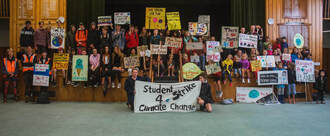
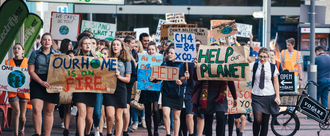
.jpg)
